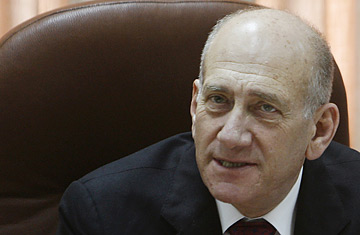
Israeli Prime Minister Ehud Olmert
The report had been dreaded by Prime Minister Ehud Olmert and his staff ever since retired judge Eliyahu Winograd was asked to assess the results and assign blame for the handling of Israel's flawed 2006 war in Lebanon. And so, when they were handed a copy of the 617-page report today, Olmert and his aides frantically skimmed the document for damning remarks that might have forced the prime minister to resign. They had a single hour before the bloodhounds of the Israel press, along with Olmert's political enemies and the families of soldiers who died in the war, grabbed copies of the same document. But, as one relieved Olmert aide told TIME: "We couldn't hope for anything better than this."
Olmert was worried that his political opponents would use the findings of the Winograd Commission to bludgeon him into quitting. But Winograd and his investigators were careful not to apportion personal blame even as they concluded that the mismanagement of the Lebanon war was "a great and serious missed opportunity."
The commission said that Israel failed on three counts: the Israeli Defense Forces (IDF) failed to rescue the two soldiers kidnapped by Hizballah militia in a cross-border raid; second, despite heavy bombing raids inside Lebanon, Israeli forces failed to destroy Hizballah's leadership; and, finally, the IDF did not protect its citizenry from Hizballah's ceaseless barrage of rockets in northern Israel. More than 1,000 Lebanese and 160 Israelis were killed in the 34-day war. Concluded the report: "We found serious failings and flaws in the lack of strategic thinking and planning, in both the political and the military echelons."
Olmert and his generals were most vulnerable to criticism of their decisions during the conflict's final 60 hours. While the United Nations was hammering out the last details of a truce, the prime minister approved a major ground assault into southern Lebanon in which 34 Israeli soldiers died and few, if any, lasting gains were made on the battlefield. The report blamed the politicians and the top brass of "equivocation" which "hurt Israel" by dithering over whether to launch the ground attack or seek a political end the war. Nevertheless, the report stated: "The goals of the ground operation were legitimate." That was a great relief to Olmert.
The battle is hardly over for Olmert. The Winograd Report may have absolved him somewhat, but he still faces a bare-knuckled brawl with his two rivals — Ehud Barak, the Defense Minister and Labor Party leader, and conservative Benjamin Netanyahu, head of the Likud party. Barak's aides noted that the report was "severe" on Olmert's handling of the war (Barak can afford to say this; he was made defense minister after the Lebanon war).
Meanwhile, on Wednesday dozens of army reservists braved rainstorms to camp outside Barak's swanky Tel Aviv apartment demanding that he honor his earlier promise that Labor resign from Olmert's coalition after the Winograd report. But Barak is now hedging; polls show that in an early election, Barak would lose to Netanyahu. So for now, Barak will probably clutch his cabinet seat tight. The politicians and press will be sifting over the gritty details of the report during the next few days, but Olmert and his new enlarged team of media monitors — their ranks have swollen from four to over 30 in advance of the war report — are putting out the word that he's been exonerated. And there's every likelihood that Olmert, one of Israel's most politically cunning but unpopular leaders ever, will keep his job.
